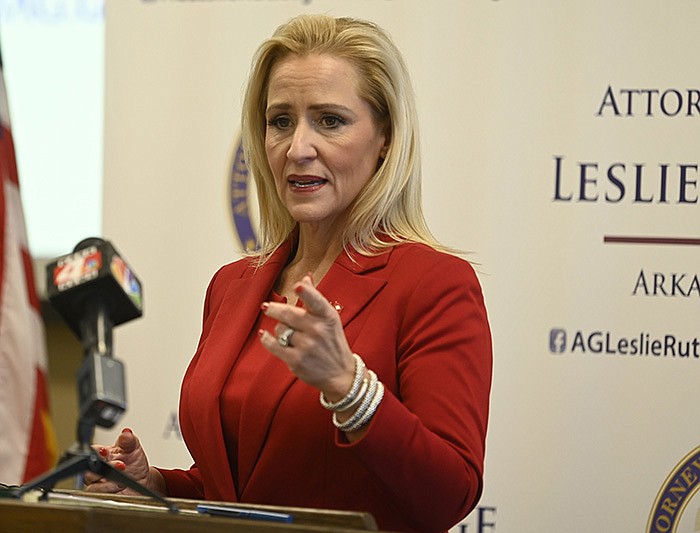Less than a month before she leaves her post, Arkansas Attorney General Leslie Rutledge announced Thursday that her office will transfer $140 million in opioid settlement funds to the state's general revenue to allow legislators to decide how to spend it.
"We have recognized that over the last six years, while we know enforcement and we know education, we want to make sure that the legislative branch is the one using the $140 million in opioid lawsuit settlements," Rutledge, who was elected in November to become lieutenant governor next month, said.
At a news conference at her office in Little Rock to announce the funds transfer, Rutledge said over the last six years of her tenure, her office has secured approximately $430 million in opioid settlements, with more than $140 million going to Arkansas.
Shannon Halijan, deputy attorney general of the Public Protection Department, said the office has approximately $20 million of the settlement money on hand, with the rest due in the coming days or weeks.
She said the office is also working out the details of settlements with several major institutions like Walmart and Walgreens, meaning some of the funds will be received by Attorney General-elect Tim Griffin's office.
Rutledge said she hadn't discussed the transfer of funds with Griffin.
After her announcement, Griffin, who like Rutledge is a Republican, said he hadn't decided what to do with the funds.
"Upon taking office, I will conduct a comprehensive review and assessment of the use of settlement funds, including spending on television commercials and public service announcements that have far exceeded historic norms," Griffin, the state's current lieutenant governor, said in a statement.
"This review is essential to ensure transparency and restore the public trust in the use of settlement funds. Second, I will act in accordance with the law and the relevant settlement agreement. Finally, I will allocate the settlement proceeds in a way that best accomplishes the goal of opioid abatement. Thousands of Arkansans have struggled with opioid addiction, including in my family, and we must do everything in our power to address this public health crisis: That may or may not involve the transfer of funds to general revenue."
Rutledge said she would be "frankly shocked" if Griffin decides not to transfer the rest of the settlement funds when he takes over.
"If the next attorney general does not want this money to go to the General Assembly and into general revenue to be used by the 135 legislators, that is something for the next administration to decide, but I would envision that anyone would want this money to be used for treatment across the state," she said.
Rutledge said she also had not talked about the transfer of funds with Governor-elect Sarah Huckabee Sanders but did discuss it with Gov. Asa Hutchinson, who was barred by term limits from seeking reelection this year, and legislative leaders.
"I had discussed it with our current governor in our role as attorney general and governor," she said.
"I would be surprised if either my successor or governor-elect Sanders would be disappointed to learn that as attorney general my team and I had successfully gotten $140 million from these companies to better treat Arkansans," Rutledge added.
Judd Deere, deputy chief of staff for Sanders, said Sanders is committed to working with leaders across state government and her partners in the Legislature, as well as through executive action, to address opioid abuse.
Rutledge said it was important to note that the lawsuits involve opioid manufacturers and distributors, meaning the funds have restricted uses. The funds can't be used for things like tax cuts, teacher pay raises or roads and highways unless the spending can be tied to the opioid crisis, she said.
She said her office has worked closely with cities and counties to create draft legislation on how to use the funds to address the opioid crisis.
She suggested that legislators create a commission to bring in stakeholders who might have more knowledge on the best ways to use the money to expand drug treatment options around the state.
"This isn't a problem that arose overnight and this isn't a solution that arose overnight," she said.
"We do have draft legislation that is available for our senators and House members to look at and consider whether they want to put forward a commission in order to have individuals appointed by the governor or the General Assembly to determine the best use of these funds."
Attorney general spokeswoman Amanda Priest said the draft legislation was not ready for public release Thursday afternoon.
Sen. Bart Hester, who will become Senate president pro tempore in January, confirmed he spoke with Rutledge about the transfer of funds.
"The funds will be used for priority needs for the state that meet the requirements of the settlement agreement," he said.
Rutledge said over the last eight years approximately 4,000 Arkansans have lost their lives to an overdose.
"The treatment issue is not something we can solve by simply filing a lawsuit against these manufactures and distributors," she said. "Treatment is something that I have spent the last almost entire decade meeting with parents and providers and others discussing."
